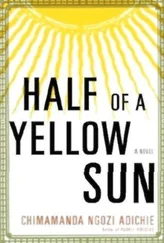“Yes. It’s raining crazily.”
“Really? It’s not raining here. I’m in Lekki.”
She found this foolishly exciting, that it was raining where she was and it was not raining where he was, only minutes from her, and so she waited, with impatience, with a charged delight, until they could both see the rain together.
And so began her heady days full of cliché: she felt fully alive, her heart beat faster when he arrived at her door, and she viewed each morning like the unwrapping of a gift. She would laugh, or cross her legs or slightly sway her hips, with a heightened awareness of herself. Her nightshirt smelled of his cologne, a muted citrus and wood scent, because she left it unwashed for as long as she could, and she delayed in wiping off a spill of hand cream he had left on her sink, and after they made love, she left untouched the indentation on the pillow, the soft groove where his head had lain, as though to preserve his essence until the next time. They often stood on her verandah and watched the peacocks on the roof of the abandoned house, from time to time slipping their hands into each other’s, and she would think of the next time, and the next, that they would do this together. This was love, to be eager for tomorrow. Had she felt this way as a teenager? The emotions seemed absurd. She fretted when he did not respond to her text right away. Her mind was darkened with jealousy about his past. “You are the great love of my life,” he told her, and she believed him, but still she was jealous of those women whom he had loved even if fleetingly, those women who had carved out space in his thoughts. She was jealous even of the women who liked him, imagining how much attention he got here in Lagos, good-looking as he was, and now also wealthy. The first time she introduced him to Zemaye, lissome Zemaye in her tight skirt and platform heels, she stifled her discomfort, because she saw in Zemaye’s alert appreciative eyes the eyes of all the hungry women in Lagos. It was a jealousy of her imagination, he did nothing to aid it; he was present and transparent in his devotion. She marveled at what an intense, careful listener he was. He remembered everything she told him. She had never had this before, to be listened to, to be truly heard, and so he became newly precious; each time he said bye at the end of a telephone call, she felt a sinking panic. It was truly absurd. Their teenage love had been less melodramatic. Or perhaps it was because the circumstances were different, and looming over them now was the marriage he never talked about. Sometimes he said, “I can’t come on Sunday until midafternoon,” or “I have to leave early today,” all of which she knew were about his wife, but they did not talk further about it. He did not try to, and she did not want to, or she told herself that she did not want to. It surprised her, that he took her out openly, to lunch and to dinner, to his private club where the waiter called her “madam,” perhaps assuming she was his wife; that he stayed with her until past midnight and never showered after they made love; that he went home wearing her touch and her smell on his skin. He was determined to give their relationship as much dignity as he could, to pretend that he was not hiding even though he, of course, was. Once he said cryptically, as they lay entwined on her bed in the undecided light of late evening, “I can stay the night, I would like to stay.” She said a quick no and nothing else. She did not want to get used to waking up beside him, did not permit herself to think of why he could stay this night. And so his marriage hung above them, unspoken, unprobed, until one evening when she did not feel like eating out. He said eagerly, “You have spaghetti and onions. Let me cook for you.”
“As long as it doesn’t give me a stomachache.”
He laughed. “I miss cooking. I can’t cook at home.” And, in that instant, his wife became a dark spectral presence in the room. It was palpable and menacing in a way it had never been when he said, “I can’t come on Sunday until midafternoon,” or “I have to leave early today.” She turned away from him, and flipped open her laptop to check on the blog. A furnace had lit itself deep inside her. He sensed it, too, the sudden import of his words, because he came and stood beside her.
“Kosi never liked the idea of my cooking. She has really basic, mainstream ideas of what a wife should be and she thought my wanting to cook was an indictment of her, which I found silly. So I stopped, just to have peace. I make omelets but that’s it and we both pretend as if my onugbu soup isn’t better than hers. There’s a lot of pretending in my marriage, Ifem.” He paused. “I married her when I was feeling vulnerable; I had a lot of upheaval in my life at the time.”
She said, her back turned to him, “Obinze, please just cook the spaghetti.”
“I feel a great responsibility for Kosi and that is all I feel. And I want you to know that.” He gently turned her around to face him, holding her shoulders, and he looked as if there were other things he wanted to say, but expected her to help him say them, and for this she felt the flare of a new resentment. She turned back to her laptop, choked with the urge to destroy, to slash and burn.
“I’m having dinner with Tunde Razaq tomorrow,” she said.
“Why?”
“Because I want to.”
“You said the other day that you wouldn’t.”
“What happens when you go home and climb into bed with your wife? What happens?” she asked, and felt herself wanting to cry. Something had cracked and spoiled between them.
“I think you should go,” she said.
“No.”
“Obinze, please just go.”
He refused to leave, and later she felt grateful that he had not left. He cooked spaghetti and she pushed it around her plate, her throat parched, her appetite gone.
“I’m never going to ask you for anything. I’m a grown woman and I knew your situation when I got into this,” she said.
“Please don’t say that,” he said. “It scares me. It makes me feel dispensable.”
“It’s not about you.”
“I know. I know it’s the only way you can feel a little dignity in this.”
She looked at him and even his reasonableness began to irritate her.
“I love you, Ifem. We love each other,” he said.
There were tears in his eyes. She began to cry, too, a helpless crying, and they held each other. Later, they lay in bed together, and the air was so still and noiseless that the gurgling sound from his stomach seemed loud.
“Was that my stomach or yours?” he asked, teasing.
“Of course it was yours.”
“Remember the first time we made love? You had just been standing on me. I loved you standing on me.”
“I can’t stand on you now. I’m too fat. You would die.”
“Stop it.”
Finally, he got up and pulled on his trousers, his movements slow and reluctant. “I can’t come tomorrow, Ifem. I have to take my daughter—”
She cut him short. “It’s okay.”
“I’m going to Abuja on Friday,” he said.
“Yes, you said.” She was trying to push away the sense of a coming abandonment; it would overwhelm her as soon as he left and she heard the click of the door closing.
“Come with me,” he said.
“What?”
“Come with me to Abuja. I just have two meetings and we can stay the weekend. It’ll be good for us to be in a different place, to talk. And you’ve never been to Abuja. I can book separate hotel rooms if you want me to. Say yes. Please.”
“Yes,” she said.
She had not permitted herself to do so earlier, but after he left, she looked at Kosi’s photographs on Facebook. Kosi’s beauty was startling, those cheekbones, that flawless skin, those perfect womanly curves. When she saw one photo taken at an unflattering angle, she examined it for a while and found in it a small and wicked pleasure.
Читать дальше












